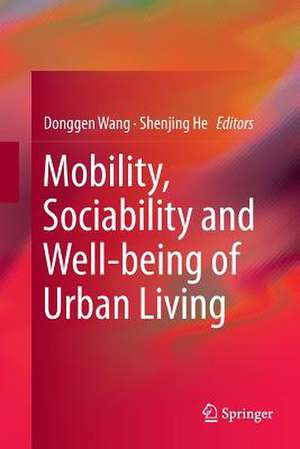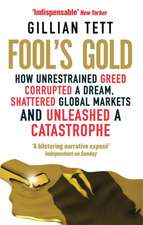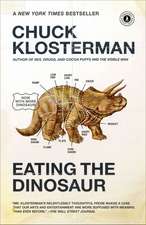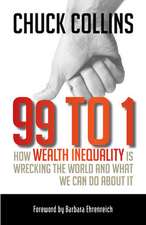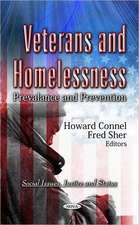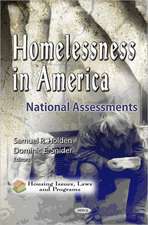Mobility, Sociability and Well-being of Urban Living
Editat de Donggen Wang, Shenjing Heen Limba Engleză Paperback – 27 mar 2019
| Toate formatele și edițiile | Preț | Express |
|---|---|---|
| Paperback (1) | 715.91 lei 6-8 săpt. | |
| Springer Berlin, Heidelberg – 27 mar 2019 | 715.91 lei 6-8 săpt. | |
| Hardback (1) | 722.84 lei 6-8 săpt. | |
| Springer Berlin, Heidelberg – 23 dec 2015 | 722.84 lei 6-8 săpt. |
Preț: 715.91 lei
Preț vechi: 753.60 lei
-5% Nou
Puncte Express: 1074
Preț estimativ în valută:
136.99€ • 143.03$ • 113.38£
136.99€ • 143.03$ • 113.38£
Carte tipărită la comandă
Livrare economică 05-19 aprilie
Preluare comenzi: 021 569.72.76
Specificații
ISBN-13: 9783662569146
ISBN-10: 3662569140
Pagini: 282
Ilustrații: XIV, 282 p. 24 illus., 14 illus. in color.
Dimensiuni: 155 x 235 mm
Greutate: 0.42 kg
Ediția:Softcover reprint of the original 1st ed. 2016
Editura: Springer Berlin, Heidelberg
Colecția Springer
Locul publicării:Berlin, Heidelberg, Germany
ISBN-10: 3662569140
Pagini: 282
Ilustrații: XIV, 282 p. 24 illus., 14 illus. in color.
Dimensiuni: 155 x 235 mm
Greutate: 0.42 kg
Ediția:Softcover reprint of the original 1st ed. 2016
Editura: Springer Berlin, Heidelberg
Colecția Springer
Locul publicării:Berlin, Heidelberg, Germany
Cuprins
Introduction.- 1. Travel mode and subjective well-being.- 2. Effects of urban residents’ mobility biographies on their current quality of life: A life history analysis.- 3.The association between travel and satisfactions with travel and life: Evidence from Twin Cities.- 4. Mobility and quality of life of the elderly in urban China: the role of household structure.- 5. Reappropriation through occupation: interrogating roadside parking in Chinese cities at a time of mass motorization.- 6. Studies on Wellbeing, Geography and Mobility: State-of-the-Art, Gaps and Future Directions.- 7. Planning and urban plagues.- 8. Moderating effect of community attachment on individual well-being under heat wave.- 9. China’s new generation migrant workers’ urban experience and well-being.- 10. Between mobility and immobility - Undocumented African migrants living in the shadow of the Chinese state.- 11. Urban Villages as Contested Social Spaces in Urban China.- 12. Disciplined mobility and the experience of migrant subalternity: the politics of motorcycle taxis in Guangzhou.- 13. Analysis of the home care satisfaction of urban elderly in Beijing.- 14. The state of being healthy in social housing communities of urban China: A case of Guangzhou.
Recenzii
“This edited book is a worthwhile addition to the well-being literature and is written in a very accessible form. It provides important insights into the role that geography and spatial scale play in understanding the interplay of mobility, sociability and well-being in our complex urban worlds.” (Jonathan Corcoran, Urban Studies, Vol. 55 (9), 2018)
Textul de pe ultima copertă
This book investigates critical urban issues related to socio-spatial segregation, housing, daily travel, mobility of the elderly, etc. from the perspective of wellbeing. This is a collection of the latest research works by frontline researchers working in the fields of geography, urban studies, transport, and sociology. Drawing on theoretical and empirical explorations, collected chapters in this book connect mobility and wellbeing, bridge geography and health, and analyze the implications of mobility disadvantages on urban marginal groups’ wellbeing. Research findings presented in the book are also highly relevant for practitioners and policy makers in the pursuit of improving urban livability since wellbeing, or quality of life, is increasingly considered as an important criteria alternative to income growth to evaluate economic, social and urban development.
Caracteristici
Brings together interdisciplinary analysis of wide-ranging urban issues from the perspective of wellbeing Compares empirical data collected from different cities across different parts of the world Features state-of-the-art research by a group of internationally recognized scholars and frontline researchers from different countries Includes supplementary material: sn.pub/extras
